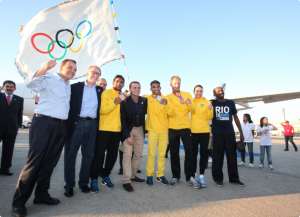 The IOC Coordination Commission visited Rio in mid March. Since the last visit, Rio announced a 27% increase in the games budget and suggested further rises were likely.
The IOC Coordination Commission visited Rio in mid March. Since the last visit, Rio announced a 27% increase in the games budget and suggested further rises were likely.
Nawal El Moutawakel, head of the IOC’s coordination panel for Rio, noted that deadlines for Rio 2016 were “very, very tight.” She mentioned Sochi several times, praising the Russians for their planning. “Good intentions are worthless if they are not backed by effective leadership and good governance.” There has been quite some talk about creating clear lines of authority and accountability, a theme that was well-implemented at London 2012 and has been well-documented – with that experience taken up at Sochi. It seems that delays have shifted timelines to a point where little future leeway is available.
The Mayor of Rio de Janeiro, Eduardo Paes, has conceded that work on a large cluster of venues for the 2016 summer Olympic Games is much delayed. This is really stating either, the obvious, or certainly what has been known for some time but everyone seemed to hold their breathe. Work at the Deodoro complex of venues has hardly commenced. This zone in the western part of Rio will host seven Olympic sports, equestrian, mountain bike and BMX cycling, modern pentathlon, shooting, canoeing – slalom, hockey and fencing. Paes is confident the work program can move at pace….and when one sees how the program at the World Cup Itaquerão / Corinthians stadium in Sao Paulo was accelerated, 2 years construction with 3 shifts, yes it is quite possible. There is also concern about the golf venue at Reserva de Marapendi in the Barra Cluster.
Major games stakeholder meetings are taking place in Brasilia at present, to resolve issues about responsibilities, communications and funding for the Rio games. There is much talk again of a matrix of responsibilities…this was the topic of many meetings and between the three levels of government over two years ago, recognised as vital to moving forward on an agreed and viable program, but never developed to an agreed stage for implementation. Frankly, it may well be that again, important matters currently impeding projects will be cleared but an ongoing formula may remain elusive.
There is still not a properly integrated budget. It is reported that so far organisers (read city government + state government + Rio 2016) have budgeted for 24 of the 52 projects that will be built for the Games and the cost is already at 44% of the original estimate.
Rio 2016 has announced that the football venues for the Olympic Games will be in Rio, Belo Horizonte, Salvador, Brasilia and Sao Paulo. For rugby (sevens competition), the original plan to stage rugby matches at the São Januário Stadium has been scrapped because the club in charge of the venue missed the deadline to present its project. The Organising Committee plan to move the sport into the João Havelange Stadium, which it would have to share with athletics competitions.
Mayor Paes has announced that the media village and related services for the games would now be located in or close to the  massive Porto Maravilha redevelopment, at Curicica, and delivered through the Minha Casa, Minha Vida programs that will provide housing after the games. Paes suggested the savings to Rio may be around US$150 million.
massive Porto Maravilha redevelopment, at Curicica, and delivered through the Minha Casa, Minha Vida programs that will provide housing after the games. Paes suggested the savings to Rio may be around US$150 million.
Education First, an international for-profit organisation who work all over the world, will provide a second language - primarily English – training program which will be integrated into the Rio 2016 education and culture program. About 1 million people are expected to attend courses. The company was official language supplier to the Beijing 2008 and Sochi 2014 Games.






